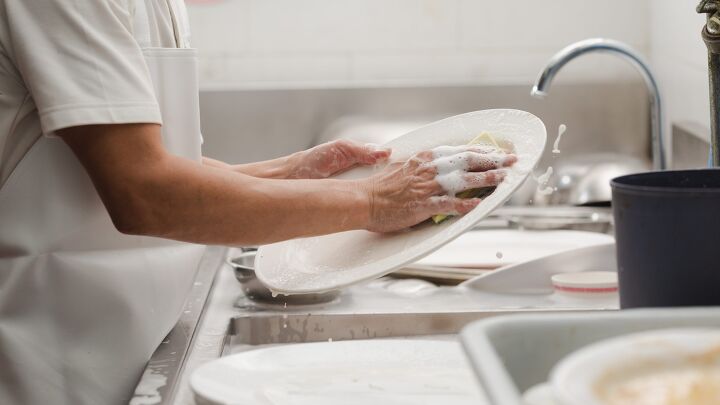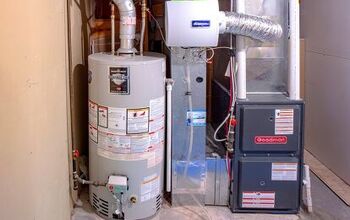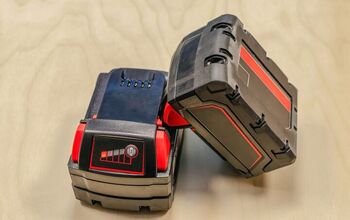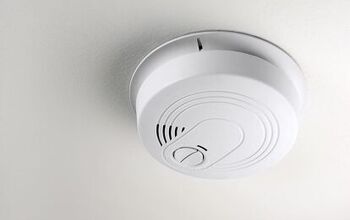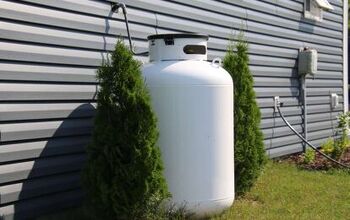Does It Cost More Money To Do Dishes By Hand Or Run The Dishwasher?

Washing dishes is part of everyday life as an adult. While the task of washing by hand can be a bit tedious, there are all sorts of devices and accessories that make washing dishes less annoying. The dishwasher is the best example of a device that makes doing dishes less time- and energy-consuming. But if you are worried about your energy costs, you might wonder if it costs more to do dishes by hand, or in a dishwasher.
Running a load of dishes in the dishwasher is usually cheaper than washing dishes by hand. Dishwashers, while electronic, use much less water than washing by hand, and even use less hot water. This makes it cheaper to use a dishwasher. Some factors to consider when calculating the energy costs of each method include how many dishes you tend to dirty on a regular basis, if you run the dishwasher full, and the size of the kitchen.
There are many techniques for washing your dishes. Everyone has their own method, but some methods work better than others. There seems to be two camps – those who wash dishes by hand and those who use a dishwasher. But which method is better for the environment and your electric bill? Keep reading to find the answer and to learn the pros and cons of both washing dishes by hand and running a dishwasher.
Which is Cheaper: Running A Dishwasher Or Washing By Hand?
If you are thinking about purchasing a dishwasher, or have one but aren’t sure how much energy it uses, you are probably wondering how much it costs to run one of these machines. The average dishwasher, while large, doesn’t use all that much electricity. Often, it uses somewhere close to 1800 watts per cycle, which is far less than using a clothes drier. It also uses only 4 gallons of water.
Conversely, washing by hand uses 20 gallons of water or more, since a faucet pours out about 2 gallons of water per minute. If you pay a lot for water usage, then there is no question that a dishwasher is the way to go. But even if you don’t, the energy to heat 20 to 30 gallons of water or more is likely to exceed the energy it takes to run the dishwasher. In general, it is almost always more energy-efficient and better for your water bill (and the environment) to use a dishwasher. You can save upwards of $450 a year by running an energy-efficient dishwasher instead of doing the dishes by hand.
There are, however, a few exceptions to this. It is important to understand all the factors that impact whether it costs more to run a dishwasher or hand-wash your dishes.
Four Factors To Consider When Choosing The Best Dish-Washing Method
1. How Many Dirty Dishes Do You Typically Wash?
The number of dishes you dirty on a regular basis can impact whether running a dishwasher or hand-washing them is a cheaper and better option. If you live alone and eat some meals out, then you may only dirty a few dishes per day. This could also mean it takes more than a week to fill up your dishwasher even halfway. Rather than causing mold and bacteria to grow, it is best to hand wash the small number of dishes you have, rather than run a mostly empty dishwasher.
2. The Type Of Dishwasher
Not all dishwashers use the same amount of water and electricity. There are old machines that can use lots more electricity than an energy-saver model. The older models also use more water, often upwards of 15 gallons. If you have an old model, consider swapping it out for a newer version to maximize your energy and water savings.
3. The “Mode” You Select
Some dishwashers have multiple cleaning modes. There may even be an energy-savings mode. This will naturally save you the most money and cost less than even the most efficient hand-washing of dishes. But other sanitizing modes can be more complex, and require additional water and high water temperatures. This is particularly true when it comes to the heated dry cycle, as this adds higher energy costs to each cycle.
4. Do You Run The Dishwasher When It Is Full?
For the best energy and water savings, you need to run your dishwasher when it is full. Therefore if you are constantly running a half-full or less than half-full dishwasher, you might end up spending more money than you should. If a lack of dishes is the problem, consider purchasing a few more dishes so you can run the dishwasher less frequently and maximize your savings.
Pros And Cons Of Hand-Washing Dishes
Benefits Of Hand-Washing Dishes Instead Of Using A Dishwasher
- Fragile And Antique China Is Often Better Hand-washed: Dishwashers might be safe for most dishes, but they can be hazardous for your most fragile and old pieces of china. This is because dishwashers use some strong jets, and they also reach high temperatures. It is always better to wash fragile dishes by hand.
- Some Woods And Natural Products Can’t Go In A Dishwasher: Hand-washing your dishes is also a better option when washing wooden utensils, wooden cutting boards, and dishes made of vulnerable natural fibers. Woods, even hardwoods, can warp from the pressure of high temperatures and extended soaking in water.
- If You Live Alone And Rarely Cook: If you rarely cook and only dirty a few dishes a day, then hand-washing them might be cheaper. If you keep the water off when you are scrubbing and only use it to rinse, you can likely use less than 2 gallons of water to wash the few dishes that you dirty on a regular basis.
Cons Of Hand-Washing Dishes Instead Of Using A Dishwasher
- Uses More Water Than A Dishwasher: The biggest con to hand-washing dishes is the amount of water it uses. Hand-washing your dishes uses upwards of 20 to 30 gallons of water on average. Dishwashers use a fraction of this.
- Often Takes More Time: Another big downside to washing dishes by hand, is it takes more time and energy. Instead of loading a machine, pressing a button, and walking away, you need to scrub and actively wash dishes until they are done.
- Drying Racks Take Up Valuable Counter Space: Lastly, there is a space issue to think about. When you hand-wash dishes, you require counter space to dry them. This can take up two to three feet of valuable counter space in a kitchen.
Pros And Cons Of Using A Dishwasher
Benefits Of Using A Dishwasher Instead Of Hand-Washing Dishes
- Saves On Energy Costs: One great benefit to dishwashers over washing dishes by hand is the energy savings. Newer energy-efficient dishwashers can save you upwards of $450 in energy costs compared to hand-washing dishes.
- Uses Less Water: Dishwashers also save water, making them potentially better for the environment. With many areas facing water shortages, this is a great way to cut back and save on your energy bills.
- Has Better Sanitation Abilities: Dishwashers often reach temperatures of 145 degrees Fahrenheit or higher. This helps kill more bacteria than washing dishes by hand.
- Takes Less Time And Effort: Using a dishwasher means you don’t need to spend lots of time scrubbing and getting wet washing dishes.
Cons Of Running A Dishwasher Over Hand-Washing Dishes
- Not Ideal For Those Who Live Alone And Use Few Dishes: Dishwashers are great, but not ideal for those who rarely cook. Running a mostly-empty dishwasher is not energy efficient.
- Can’t Put All Items In A Dishwasher: There are several types of materials you can’t put in a dishwasher, including some wood, fine china, and other items.
- They Can Damage More Fragile Items: Dishwashers are powerful, and the high temperatures and strong jets can damage glassware and other thin and fragile pieces.
Wrapping Up The Cost of Running A Dishwasher Versus Washing Dishes by Hand
Believe it or not, even though dishwashers are large machines, it is almost always cheaper to run the dishwasher than it is to hand-wash dishes. Dishwashers only use about 4 gallons of water, while hand-washing dishes uses between 20 and 30 gallons on average. You can save around $450 by running an energy-efficient dishwasher instead of washing by hand. Just be aware of factors like the mode you run your dishwasher, how many dirty dishes you accumulate on a regular basis, and the type (and age of) your dishwasher.
Related Guides:

Tom Gaffey is an expert writer who currently resides in Washington D.C. Tom has a passion for real estate and home improvement writing, as well as travel and lifestyle writing. He lived the last twelve years in Hawaii where he worked closely with luxury resorts and event planners, mastering his knowledge of aesthetics and luxury products. This is where he found his passion for home improvement and a keen interest in DIY projects. Currently, Tom resides in Washington D.C, and also working on his debut fiction novel.
More by Tom Gaffey



